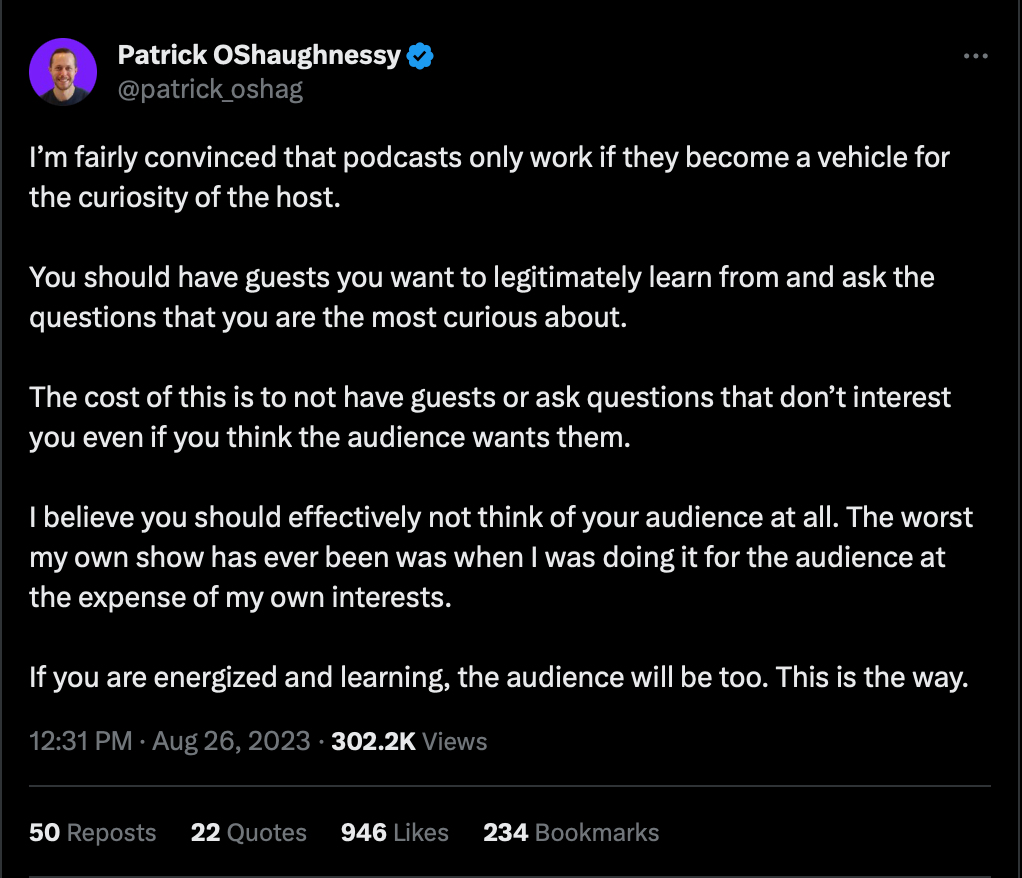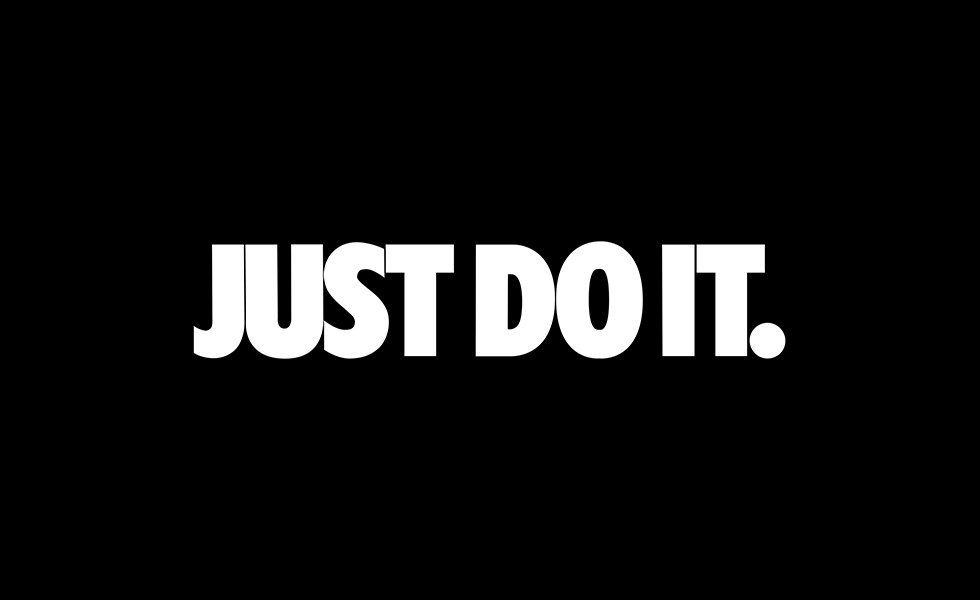Curiosity to Conviction
Life is about a few moments of conviction. You find conviction through consistent curiosity. Magic happens when persistent effort fueled by conviction happens at the right time.
The collision of curiosity, conviction, and timing is how all great investments happen. It’s how all great businesses are sparked. It’s how all great discoveries are made. If we want to pursue great results in whatever we do, then we must explore our curiosity on the way to conviction and hope the time is right.
Curiosity is the habit. Conviction is the goal. Timing is luck.
Curiosity is the only element of great results that’s in your power to cultivate. You can’t force conviction without fooling yourself. You can’t force timing on an idea that isn’t ready.
Cultivating a curious mind is akin to being a professional writer who must show up every day to write. As Steven Pressfield writes in The War of Art:
“The most important thing about art is to work. Nothing else matters except sitting down every day and trying.”
The same is true of curiosity. Seekers of conviction must show up every day to explore their curiosity, even when we don’t feel like it.
Don’t Be a Nerd, Just Do It
Art Williams, a billion-dollar insurance entrepreneur, gave a legendary speech at the 1987 National Religious Broadcaster Convention where he encouraged the audience to Just Do It. Yes, it sounds like the Nike slogan, but Nike didn’t launch “Just Do It” until 1988.
Profound mantras are simple and universal.
The part that haunts me most is when Williams describes the failing of smart people:
“Smart people spend their whole lifetime figuring things out. They always trying to figure out an easier way, and a quicker way. And another thing I found out about smart people, is they just don’t get around to doing nothing.”
It haunts me because I’ve been guilty of spending too much time figuring things out and not enough time just doing it.
I read. I study. I theorize. I dream. All I’ve figured out from all my time figuring things out is that those acts only prepare us for curiosity. We aren’t truly curious about something until we do it.
I’m a long-time strength athlete who has spent a couple of decades in gyms, and there’s an archetype of the smart-but-doing-nothing person you find in every strength gym. He’s the enemy of useful curiosity and the ultimate theorist. I call him The Nerd.
The Nerd spends all day reading studies about the biomechanics of strength, optimal protein timing, rest period maximization, and a bunch of other stuff that is marginally useful in actually getting strong. He spends his time lifting light weights with “perfect form.” He can tell you everything about strength training, but he doesn’t even look like he lifts.
Don’t be The Nerd. Stop preparing, and do something.
If you want to acquire the knowledge of a practitioner rather than just a theorist, you have to get under a heavy bar and feel what crushing weight feels like. You have to risk failure or maybe even injury to your body or pride.
The goal of curiosity is to discover a secret about the world to build conviction that leads to persistent action.
Faraday didn’t just read about electricity, he built motors and batteries. Dyson didn’t just study vacuums, he built 5,000 prototypes on the way to his first model. Elon didn’t just research rockets, he tried to buy one from Russians, then decided to build his own.
Experimentation is the true form of curiosity because experiments are experience, and the whole point of curiosity is to gain usable knowledge.
Over the past few months, I’ve conducted weekly experiments with AI to create intelligent stock indices, design a luxury handbag, and clone my voice. Those experiences left me with a few convictions that people who haven’t experimented with AI the same could not reach:
- AI is the future of stock indexing. It will take decades, but there will be AI indices with more assets indexed to them than the S&P 500 today (almost $6 trillion).
- AI is nowhere close to eliminating the need for human labor, but the composition of valuable human labor will change. It will be more creative and more empathic.
- AI will be as big or maybe even bigger than the bulls think.
To express real curiosity, read less and do more. You never know where your experiments might take you.
Make Your Curiosity Public
Patrick O’Shaughnessy of Invest Like the Best says that the best podcasts are vehicles for hosts to explore genuine curiosity. Jesse Pujii suggested that’s true of all human endeavors.


The exchange is both simple and profound. Profound ideas are simple and universal, just like mantras.
Authentic curiosity always makes for interesting content for people similarly curious. Even more important than attracting an engaged audience, sharing your curiosities with the public forces you to develop your curiosities to a deeper understanding. When you write for an audience, you teach, and when you teach you must have a depth of understanding beyond the similarly curious reader.
At its best, writing is a vehicle for my curiosity, and those tweets convince me to worry less about the audience and just be curious. When I write about things I think will “attract audience,” I often lose subscribers. When I write about genuine curiosities, the posts tend to perform well. Sometimes I’m even surprised by who reads and responds to them.
Make your curious experimentations public because you never know who might read about your curiosity. The world can’t smile on you with luck if it doesn’t know what you’re doing.
Lose Focus to Find Focus
We can’t predict where curiosity will take us, and that’s entirely the point. The exploration of curiosity demands a wandering lack of focus. If you don’t wander, you can’t discover new ideas that can collide with existing ones to form convictions.
Once discovered, conviction demands persistence. If you aren’t convicted, you won’t persist. If you don’t persist, you aren’t convicted.
True conviction forces you to Just Do It in the words of Art Williams. Until you find it, you have to force yourself to just experiment with your curiosities. Everything else will take care of itself.
